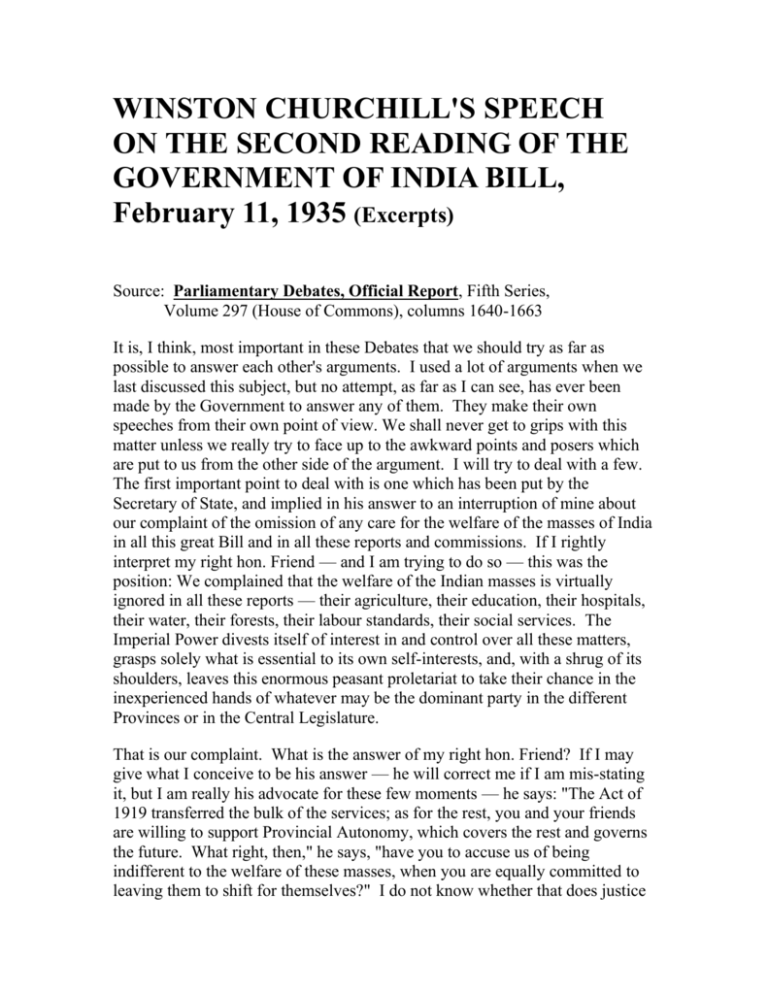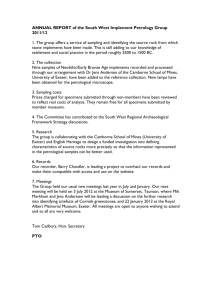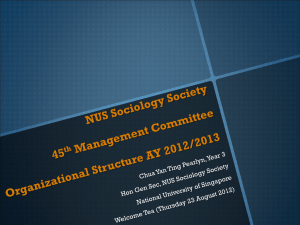Churchill's Speech on India Bill, 1935: Excerpts
advertisement

WINSTON CHURCHILL'S SPEECH ON THE SECOND READING OF THE GOVERNMENT OF INDIA BILL, February 11, 1935 (Excerpts) Source: Parliamentary Debates, Official Report, Fifth Series, Volume 297 (House of Commons), columns 1640-1663 It is, I think, most important in these Debates that we should try as far as possible to answer each other's arguments. I used a lot of arguments when we last discussed this subject, but no attempt, as far as I can see, has ever been made by the Government to answer any of them. They make their own speeches from their own point of view. We shall never get to grips with this matter unless we really try to face up to the awkward points and posers which are put to us from the other side of the argument. I will try to deal with a few. The first important point to deal with is one which has been put by the Secretary of State, and implied in his answer to an interruption of mine about our complaint of the omission of any care for the welfare of the masses of India in all this great Bill and in all these reports and commissions. If I rightly interpret my right hon. Friend — and I am trying to do so — this was the position: We complained that the welfare of the Indian masses is virtually ignored in all these reports — their agriculture, their education, their hospitals, their water, their forests, their labour standards, their social services. The Imperial Power divests itself of interest in and control over all these matters, grasps solely what is essential to its own self-interests, and, with a shrug of its shoulders, leaves this enormous peasant proletariat to take their chance in the inexperienced hands of whatever may be the dominant party in the different Provinces or in the Central Legislature. That is our complaint. What is the answer of my right hon. Friend? If I may give what I conceive to be his answer — he will correct me if I am mis-stating it, but I am really his advocate for these few moments — he says: "The Act of 1919 transferred the bulk of the services; as for the rest, you and your friends are willing to support Provincial Autonomy, which covers the rest and governs the future. What right, then," he says, "have you to accuse us of being indifferent to the welfare of these masses, when you are equally committed to leaving them to shift for themselves?" I do not know whether that does justice to his point of view, but I certainly felt that it was an argument which we had to meet. What is our answer? We have an answer; it is this: The first 10 years of the Montagu-Chelmsford reforms showed a marked deterioration in the transferred social services — such a marked deterioration that we cannot allow this process to continue unchecked. Now that we are extending a far fuller measure of Home Rule to the Provinces, we must make a new provision to secure reasonable and decent efficiency. We are handing over services of immense consequence, for instance, irrigation and the forests — irrigation, that highly artificial system upon which a quarter of the food of India depends; and the forests, the cutting down of which would affect the humidity, and also the springs and the whole drainage and canal system on which great Provinces and communities exist in what would otherwise be blistering desert. These are handed over, in contradiction, I gather, of the whole advice of the Simon Commission — I have their report here. I cannot find an absolute positive veto, but the whole page which I have here deprecates this course in the strongest manner. It seems to me that there is only one way for us to preserve this control, and that is by the system which was mocked at by the hon. Member for Caerphilly in a personal sense, but not in a Parliamentary sense. It can only be done by a portion of the money available for the Provincial Governments being meted out to them from the Central Government under some system and with an inspectorate similar to that to which we are accustomed here in regard to education and other matters, which will ensure that there is not a grave administrative breakdown or a serious decline in the Provinces. That is our answer, and it is the only safeguard against progressive deterioration. Moreover, it is the Government's only defence against the charge that they have abrogated their present responsibilities to the people of India, and that they are not caring any more what happens to these poor people. We shall place upon the Paper a series of Amendments to give effect to this method and system, which, I firmly believe, we are bound in duty to do if we are to proceed even with the Provincial sections of this Bill. The hon. Member for North Bristol (Mr. Bernays) put a series of questions to us on Friday, one of which was: "Do you or do you not believe in democracy?" That is a fairly large question. We all remember the gentleman who, on being shown an elephant for the first time, said he did not believe it; and there was the lady who wrote a metaphysical treatise, whose name, unfortunately, escapes me. Perhaps my right hon. Friend the Lord President, whose various and numerous excursions into literature adorn the culture of our political life, will be able to supply the missing name. This lady began her treatise with the words: "I accept the Universe." And, as we all know, Mr. Carlyle made the celebrated comment: "Gad, she'd better." That is rather like my feeling about democracy. I accept it. But I am a good deal more doubtful whether democracy believes in Parliamentary institutions. There was a very fine article, which greatly impressed me, written by the hon. and gallant Gentleman the Member for Hitchin (Sir A. Wilson) reminding us of the utter failure of all the Parliaments that have ever been set up in the East. We have only to look across the Channel in Europe to see how democracy tends in its present manifestation to be injurious to the Parliamentary system and to the personal liberties which are dear to the Liberal heart. I should like to ask the hon. Member, does he call this Bill democracy? Is the communal franchise democracy? Is caste reconcilable with democracy? Is the idea of 60,000,000 untouchables reconcilable with any sort of democratic system? The foundation of the democratic idea is that one man is as good as another, or better. Are the second chambers in this Bill democracy? Is it democracy to have indirect election— four or five men in a room, we were told, choosing the delegates of a great Province? The hon. Member takes us to task as to whether we believe in it. I ask him the kind of democracy he is voting for. Is it democracy to spatchcock into the midst of your central elected chamber one-third of the representation of the stewards and bailiffs of the hereditary Princes, who are autocrats? The hon. Member had really better go to the Liberal Summer School without delay and brush up his fundamentals, or else he will run a very grave risk of forfeiting his deposit. It is fashionable, wherever the influence of the Government extends, for prominent Conservatives and high officials to take a needlessly poor view of our rights and our position in India. I was sorry to read of a high military officer in India speaking of us as aliens. The Joint Select Committee repeatedly stigmatised our rule in India as irresponsible. The Lord President made a reference to the Indians having an increasing preference for putting their confidence in men of their own race and language. To-day the high water mark is reached by the Attorney-General, who, on being challenged by me, exulted that the influence of the British district officer was now no longer so paramount as it used to be. I am very sorry to hear of this downcry of our national credit. None of it is true. All of it is utterly untrue. We are no more aliens in India than the Mohammedans or the Hindus themselves. We have as good a right to be in India as anyone there except, perhaps, the Depressed Classes, who are the original stock. Our Government is not an irresponsible Government. It is a Government responsible to the Crown and to Parliament. It is incomparably the best Government that India has ever seen or ever will see. It is not true to say that the Indians, whatever their creed, would not rather have their affairs dealt with in many cases by British courts and British officers than by their own people, especially their own people of the opposite religion. Any Hindu would prefer to have his case dealt with by a British officer than by a Mohammedan, and vice versa. I have been told that there are frequent instances, and modern instances, of peasants who have a quarrel in a village and both parties walking 40, 50 or 60 miles to find a British district officer who can adjust the trouble between them. Talking about going to people of your own race and language and so forth, when Mr. Gandhi had his appendix removed he was very careful to insist upon a British surgeon. Instances like this could be multiplied indefinitely and it is wrong, indeed it is heartbreaking to find the great name of Britain in India so wantonly and improvidently depreciated by the very functionaries whose prime duty it should be to defend them. A similar mood of disparagement affects the defence of our commercial rights with India. I always pay great attention to what my Noble Friend the Member for Horsham (Earl Winterton) says of India. The line that he has taken upon it is remarkable. As the old song says, his propensities are all the other way. He asked me whether we who constitute the Conservative Opposition adhere to the so-called Fiscal Convention of 1919. I do. But I place a very different interpretation on it from that of the Government spokesmen. The Fiscal Convention of 1919 is not a convention in the sense of being a treaty. It is a unilateral declaration of policy. It does not confer fiscal autonomy upon India or upon the Government of India. It does not transfer British sovereignty to an independent external body. The Government of India is not an independent body. It is a projection, to a very large extent, of the Government of Great Britain. It is open to the Secretary of State to address and, if necessary, to instruct the Viceroy, and through him the Government of India. The closest consultation in practice — the weekly letter — prevails, or ought to prevail. Many representations in my own recollection have been made by Secretaries of State to Viceroys in regard to tariffs affecting different branches of British trade. The Crown appoints the Viceroy, the Crown appoints the Finance Member of the Viceroy's Council, the Crown appoints the important functionaries who compose the Government of India, and in the ultimate issue these functionaries can be recalled by the authority of the Crown and others appointed in their stead whose views are in harmony with those of Parliament. Of course, it might not be right or expedient to do that. That would entirely depend on the circumstances of the case and the time, but to say that we have transferred fiscal sovereignty, that India has complete fiscal autonomy, is not warranted either by the letter or by the spirit of the so-called Fiscal Convention. It has always been understood, until the last five disastrous years of these relations, that both the Viceroy and the Secretary of State owe a duty to both countries in the maintenance of healthy, fruitful, fair trading conditions. While we maintain an Army in India at a great burden of expense to this country, while we give the protection of our fleet, while we give the fruitful advantage of our trade, we are entitled on the highest grounds of justice, as well as empowered by hitherto unimpaired sovereignty, to proper and special consideration in regard to our trade. Sir S. HOARE: Is my right hon. Friend in favour of continuing the system under which we do not interfere when the Viceroy and the Legislature agree on tariff questions, that is to say, would he impose a tariff upon India if India were unwilling to have it? Mr. CHURCHILL: If my right hon. Friend had followed my argument he would see that it entirely covers the point. I have pointed out that, if the Viceroy and the Assembly are in accord, the Secretary of State does not interfere, but, as the Secretary of State is in special relation to the Viceroy, it is not an agreement of two external independent bodies. Do you think you could let a point like that slip when the livelihood of millions in this country might depend on the interpretation of our rights? It may be well and wise to give way and to interpret your rights with prudence and discretion, but that our own Minister, the representative that we have in this House, should take such a very low and poor view of the valid rights and authority that we possess in this House is indeed much to be regretted. [Interruption.] During the last five years certainly it seems to me that duties have been raised out of all relation either to the trade between the two countries or even to the interests of the Indian revenue. The hon. Member for Caerphilly and the hon. Member for North Bristol speak of this matter as if in trade matters what becomes an advantage to one country can only be obtained to the detriment of another. That is an absolute contradiction of all Free Trade principles. One of the first maxims that I honoured, and still honour, in the Free Trade armoury is that all legitimate interests are in harmony, and that the good of one country may well be the good of another, whether within or without the Empire, and all the more stimulating and all the more beneficial if within the Empire. It is not a question of one country exploiting another, but of both deriving reciprocal benefits through the interchange of goods and services upon the largest possible scale. Of course, we are confronted with the old choice of self-government versus good government. We are invited to believe that the worst self-government is better than the best good government. That is going too far, but I think no one would look at it in that way. It is a matter of degree. It is a matter than can only be judged in relation to the actual circumstances and conditions. Everyone is, in fact, approaching it on those lines. The modern view is not concentrated entirely on the sovereign virtues of self-government. On the contrary, there is the idea of the external aid to be given by one nation to another. How happy we should be if the United States were willing to place her fleets and armies at the disposal of the League of Nations to protect countries in Europe against an aggressor. How we should rejoice. Yet it is those very functions which we have discharged and are discharging in India that have given India its immunity from the perils, the anxieties, the disorders and the burdens which oppress the strongest and most civilised nations in Europe. That is not the principle of selfgovernment. It is the principle of beneficial aid from an external source for a virtuous object. This protection and security cannot be removed from India. They have grown with our growth and strengthened with our strength. They will diminish with our diminution and decay with our decay, if I may paraphrase a famous sentence. In so far as they are withdrawn and this external aid withheld, India will descend, not quite into the perils of Europe but into the squalor and anarchy of India in the sixteenth and seventeenth centuries. It seems to me that the present infatuation of the Liberal mind, and I must say of the more intellectual part of the Socialist mind, is at this moment very serious. Their error is an undue exaltation of the principle of self-government. They set this principle above all other principles; they press it to the destruction of all other principles. Let satisfaction be given to the idea of self-government and in the end, they assure us, all will come right, and the consequences, however, evil, will fade into the background. Let there be self-government and all will be well. But see the absurdity of this in application. Let me take an instance. The Bombay and Ahmedabad mill-owning millionaires, we will say, obtain a corrupt influence over the Congress Party and so exercise a dominating influence in the new Legislature; and the Legislature, under their influence, sets up a prohibitive tariff which causes widespread distress in Lancashire, which affects the Indian revenue and which horribly denies and stints the vast agricultural population of India in its legitimate needs. In the result enormous profits are reaped by this handful of exploiters. And then what does my right hon. Friend say? That he must regard that with sombre acquiescence as an example of the less successful working of his system of self-government: But if, on the other hand, the Viceroy and the Secretary of State in close association influence the Government of India to limit the tariff to bona fide revenue purposes and to the degree within which the interests of the Indian consumer are adequately considered and protected from monopoly, then that wise and prudent and righteous measure would be condemned as the shameful exploitation of one country by another. No other country in the world would consider such an argument for a moment. No other country in the world having Asiatic possessions would for a moment look at such arguments—and other countries are as intelligent in their own spheres as we are. The French, I believe, export 50 per cent of their whole exports to their own Colonies; and the Dutch also. None of these countries would submit to this extreme interpretation of a theoretical doctrine, pushed beyond all bounds of common sense and beyond all bounds of common humanity, either to the people of India or to the people of this country. I accept the so-called fiscal Convention with the interpretation which I put upon it. I have been at the centre of affairs for a very long time, and I know the interpretation that has been put on it for many years by people just as competent as many of those who now direct our affairs.... The Government proclaim their trust in the Indian political classes — but they show their distrust by the multitude of Safeguards they have introduced. Take the question of the provisions with regard to the handing over of the police. We hear all this talk about the educative value of responsibility, and it is beautifully expressed, but what is the responsibility that will really be given to the Indian Minister of a Province in regard to this? It seems to me that it is very seriously inroaded upon. He must not interfere with the internal government of the police; he cannot appoint or dismiss the chief of the police; and he is not to know the information on which the police act, although he will have to bear the responsibility of action which may involve bloodshed. It is no good saying that one should not tell them these things for they must be well known to Indian lawyers and others who have studied the matter. Here, again, you have made the great mistake of using all kinds of language not fully justified by the act and facts for which you are responsible. The Government are floundering in the old bog of government by consent with consent not forthcoming. But there is one matter upon which the Indian Legislature will have great power and great temptation to use its power, and that is in the matter of trade relations between the two countries. When this Trade Pact, this poor meagre Pact for the sake of which the Manchester Chamber of Commerce sacrificed its opportunity of stating its whole case before the Joint Select Committee — when this Pact was rejected the other day, some of our friends who support the Government Bill met us with a superior, but at the same time rather sickly smile and said: "This means nothing; they are not responsible; they have not yet got the healing, educative, steadying, stabilising force of responsibility operating upon them; when they have that it will be all very different." I do not know about that. If there is a man who wishes to kick you but has not the power, are you to say: "Give him the power and you may be sure you will be quite safe"? It may be true. No one can say that it is not conceivable, but it is not at all a convincing or alluring argument. Here our Irish experiences ought to be relevant. It ought to be relevant upon this question of the healing, educative virtues of responsibility. We gave them full responsibility and everything necessary to full autonomy. We had a solemn treaty and there you had able and resolute men who had pledged their faith to that treaty. But what happened? It was this. Both the Government in Ireland and the Opposition were forced to vie with one another in showing who could be the most disagreeable to England. The Government would have liked, as I know, to show us friendly feeling, but they did not dare for Opposition Members gained popularity throughout the country by showing how they could beat the Government hollow at the game of twisting the lion's tail. Because the Government were not so good at kicking England as they were the Opposition finally installed themselves in their places, broke the treaty and ruined the country. That is what happened in Ireland. Of this healing virtue of responsibility this certainly is not an encouraging example. It is not at all proof that the medicine in which you have such unbounded faith will in all cases produce immediate recovery. You have not got, as you have in Ireland, a practical and complete autonomy. This new Parliament will be obstructive at every point. The Opposition said the other day that they would have very little to do. They could criticise the administration and attack the safeguards, and you have furnished them with a means to attack the safeguards. What is the means by which they can attack the safeguards? It is by maltreating the trade. They will have Lancashire as a hostage, they will be able to torture Lancashire, and they will be able to extract from the Government and extort from the Viceroy diminution of the safeguards. They will have that in addition to all the other mighty persuasive powers of parliamentary procedure. I have watched this story from its very unfolding, and what has struck me more than anything else about it has been the amazingly small number of people who have managed to carry matters to their present lamentable pitch. You could almost count them on the fingers of one hand. I have also been struck by the prodigious power which this group of individuals have been able to exert and relay, to use a mechanical term, through the vast machinery of party, of Parliament and of patronage both here and in the East. It is tragical that they should have been able to mislead the loyalties and use the assets of the Empire to its own undoing. I compliment them on their skill, and I compliment them also on their disciples. Their chorus is exceedingly well drilled. We listen to their parrot cries — "We have set our hands to the plough; we must plough the furrow to the end, even if the course is folly, and even if the end is disastrous." We are told that something must be done. My father Lord Randolph Churchill was often credited with saying that when he heard people going about saying that something must be done, he had noticed that something very foolish was done. We are told that you cannot put the clock back. What nonsense. We put the clock back every year with highly beneficial results. Why do we put it back? That is what I want the House to notice. We put it back to place ourselves in more harmonious relation with the great facts of nature. We do not try with our little clocks and watches to run counter to nature. That would bring us into confusion or be entirely ineffectual. The error of the Government is that they are trying to put the clock forward without regard to the true march of solar events. They are trying to put it forward in the hope that the sun will alter its process because of their little dodges. So much for the argument that you cannot put back the clock.... This is the first time that this extended and elaborate Bill has been brought out into the open and exposed to the criticism of the House of Commons. I believe that it will be possible to convince the House and the country that the Federal proposals are untimely and unworkable. I believe that they could be riddled in fair and free Debate, and that if the scheme which is now being pressed forward — the whole of it, not only the Federal, but also the Provincial — were dropped by the Government it would be the cause of great relief not only throughout this country, but from one end of India to the other. We shall endeavour to conduct our opposition as far as in us lies to show the fatal faults and defects of this Bill. But we shall aim at doing more. We shall try to instil into the minds of the peoples of Britain and of India a different and a new conception of the relations between the two countries. We hope once and for all to kill the idea that the British in India are aliens moving, with many apologies, out of the country as soon as they have been able to set up any kind of governing organism to take their place. We shall try to inculcate this idea, coming now to be mentioned more and more in many quarters of the House, that we are there for ever as honoured partners with our Indian fellow subjects whom we invite in all faithfulness to join with us in the highest functions of government for their lasting benefit and for our own.








